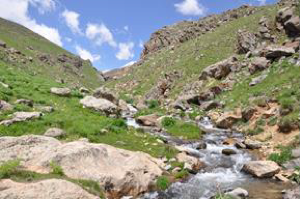First published on 01/05/2014, and last updated on 03/05/2018
By: Mina Esteqamat and Morvarid Kamali, Centre for Sustainable Development and Environment (Member)
The Taklé tribe, one of the 32 tribes of the Shahsevan tribal confederacy in Iranian Azerbaijan, covers a territory of about 12,000 hectares and extends from Mount Savalán as summering grounds to Mughan Plain as wintering grounds. The social structure of this tribal community includes 5 sub-tribes, 12 clans and 57 nomadic camps.
In recent decades, parts of their ancestral tribal territory have been allocated to outsiders and to government or private projects run by people with no sense of “belonging” there, which has accelerated the degradation of nature and its resources. One specific consequence of this degradation took place 5 years ago when disastrous floods destroyed the main riverbed of the Alidarvish River, along with the rainbow trout – the main native fish species and also the main source of livelihood for the indigenous community. Following the disappearance of the trout, the brown bear lost its main food source and left the area to find food elsewhere.

In this context, the Taklé tribe decided to restore their territory and its habitats, relying on their traditional knowledge and customary management practices. To address this issue and support their initiative, a project was prepared with the help of CENESTA and the support of UNDP/GEF/SGP. The project enabled them to start the rehabilitation of upland rangelands by seeding native species and constructing small earth dams, then repopulating the river with a fish-breeding program. Soon after provision of the food resource, the brown bear came back to its habitat. Restoration and rehabilitation of key elements of the ecosystem are among the ongoing successful results of this project towards sustainable livelihoods and conservation of nature.
